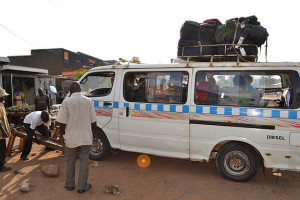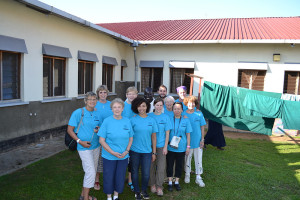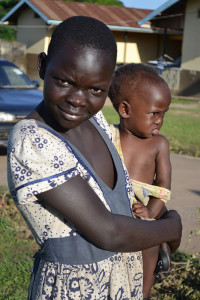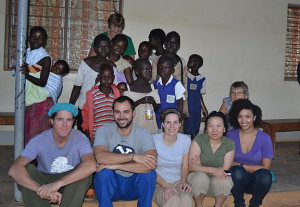VOSH Mission Report
Arua, Uganda
VOSH/Southeast
November 2011
 After several months of preparation and a few long flights, our team of 11 VOSH volunteers met each other and Mr. Vasco Oguzua at the Entebbe airport in Uganda. We then traveled approximately 10 hours north by bus. We were prepared to provide basic eye care to the under-served populations of the West Nile Region of northern Uganda from November 10-20, 2011.
After several months of preparation and a few long flights, our team of 11 VOSH volunteers met each other and Mr. Vasco Oguzua at the Entebbe airport in Uganda. We then traveled approximately 10 hours north by bus. We were prepared to provide basic eye care to the under-served populations of the West Nile Region of northern Uganda from November 10-20, 2011.
 Our team was blessed with the experience of well-seasoned volunteers, who had been on numerous trips and with the enthusiasm of young students. We were invited by Nile Care, a non-profit organization which is dedicated to providing basic services to the people of this region and to improve the quality of life. Mr. Vasco Uguzua coordinated efforts between the members of VOSH, the local volunteers, interpreters and the local Lion’s Club to produce a successful endeavor which served 3403 gente.
Our team was blessed with the experience of well-seasoned volunteers, who had been on numerous trips and with the enthusiasm of young students. We were invited by Nile Care, a non-profit organization which is dedicated to providing basic services to the people of this region and to improve the quality of life. Mr. Vasco Uguzua coordinated efforts between the members of VOSH, the local volunteers, interpreters and the local Lion’s Club to produce a successful endeavor which served 3403 gente.
We brought over 5000 pair of used and new glasses, either from StudiOptyx or from the Lion’s Recycling Center of Wisconsin. We brought over 50 lbs of eye drops, many of which were donated from Allergan and Bausch and Lomb. Laura, our team RN, brought along equipment and supplies to screen for diabetes and hypertension.
 Arua is a city 500 km northwest of the capital of Kampala. Our accommodations were very nice at the Arua diocesan center or campus, ‘Christos Center’. Meals included fresh pineapple, bananas, avocados and jack fruit. We usually ate eggs and toast, arroz, beans, cassava yams, sweet potatoes, matooke, chicken and goat. Although the ethnic language of the area was Lugbara, many of the people we encountered spoke English.
Arua is a city 500 km northwest of the capital of Kampala. Our accommodations were very nice at the Arua diocesan center or campus, ‘Christos Center’. Meals included fresh pineapple, bananas, avocados and jack fruit. We usually ate eggs and toast, arroz, beans, cassava yams, sweet potatoes, matooke, chicken and goat. Although the ethnic language of the area was Lugbara, many of the people we encountered spoke English.
We traveled by bus Sunday morning to the small town of Maracha, approximately 15 miles to the north of Arua. It was over an hour bus ride, close to the South Sudanese border. We arrived with our equipment and glasses, surprised to have such large crowds waiting for us. They had heard the radio announcements that there would be a free eye clinic. After a long day of seeing patients we drove back in the dark and arrived back in Arua at approximately 9:00 pm that evening. We held clinic at that site for two days.
 Tuesday, Wednesday and Thursday clinics were held at the Arua Regional Referral Hospital-eye department; their staff was very supportive of our efforts. The people of the area waited many hours to be seen and to hopefully receive glasses; the lines were so long. On Tuesday, just as we were finishing up, we were notified that a bus had arrived from eastern Congo and the people had been waiting to be seen. No tenían lugar para pasar la noche y nos pidieron para ayudarles a. Debido a que no había electricidad en la clínica, it was difficult to put away our equipment in the dark. Después clínica el día 3 y 4, we arrived back to the campus to gladly work with more local people and staff from the Radio Pacis station.
Tuesday, Wednesday and Thursday clinics were held at the Arua Regional Referral Hospital-eye department; their staff was very supportive of our efforts. The people of the area waited many hours to be seen and to hopefully receive glasses; the lines were so long. On Tuesday, just as we were finishing up, we were notified that a bus had arrived from eastern Congo and the people had been waiting to be seen. No tenían lugar para pasar la noche y nos pidieron para ayudarles a. Debido a que no había electricidad en la clínica, it was difficult to put away our equipment in the dark. Después clínica el día 3 y 4, we arrived back to the campus to gladly work with more local people and staff from the Radio Pacis station.
We provided over 2658 pair of glasses during the 5 days of clinic and referred approximately 161 patients who needed to have cataract surgery. Hemos sido testigos de muchos casos de ceguera, either unilateral or bilateral; due to trauma, glaucoma, diseases, cataracts or unknown causes. Junto con las gafas, we provided many donated bottles of drops including anti-allergy drops, artificial tears and glaucoma drops. Trabajamos junto a los médicos locales y ayudamos para educarlos sobre cómo usar las gotas y la forma de tratar ciertas enfermedades. Revisamos con ellos nuestras protocolos para después de la operación de cataratas cuidado. De ellos, we learned so much about what they encounter on a daily basis and what their treatment protocols are and how they deal with the lack of health care.
Although we encountered barriers which we found to be lack of water and electricity, illness, injury, transportation, language barriers, large crowds, lack of supplies and dead batteries, we certainly found the satisfaction of caring for others in this beautiful part of the world.
